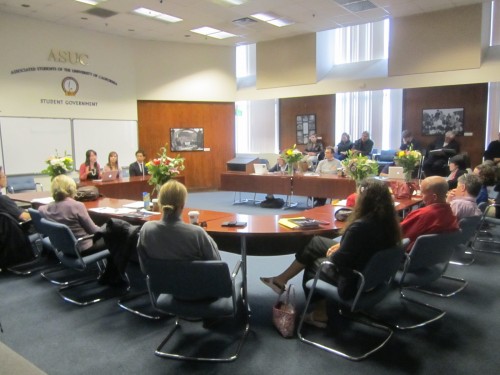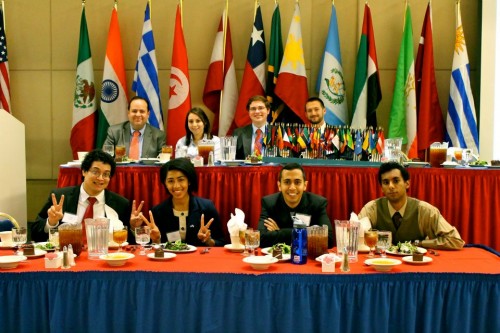While University sponsored Model UN conferences provide the bulk of competition on the high school MUN circuit, high school hosted conferences can be a vital tool for any club. Well-planned local high school conferences who only have a few delegations attending can still be fun experiences that are also great places to train new MUN delegates. Though it is a long and arduous process to host a MUN conference, it can be a great experience with proper staff and organization. Here are the measures you need to take to reduce stress and enjoy the experience.
Getting everything started:
- Make sure your officers approve of the idea. Hosting is a big decision and it will be a team effort. Listen to what suggestions or doubts they might have so that your board is aware of the different situations that could potentially happen. Even if you are the president, it doesn’t mean that the rest of your group doesn’t have a say. Once your officers approve, you can start planning how to get it officially approved as an event.
- Talk to your sponsor. The sponsor is the bridge between the administration and you and will be one of the most important people in this process. For every request you need that requires your school administration, it will be the sponsor that represents your club. Work with your sponsor to pick multiple dates that work for your team so that the sponsor can talk to an activities director. The sponsors are crucial for the background work such as setting and cleaning up rooms and having access to any other rooms. Also, remember that your sponsors have jobs and families too. They give up a lot of time for their MUN teams, so make sure to cooperate with them!
- Stay updated with any new information regarding approval. Checking for approval is exactly what it sounds like: a constant trip back and forth from an office in charge of school events. Going every day can be a bit tedious but if you haven’t received a response in days, you should be concerned. Stay on top of the deadlines; extending by a few days is a mess. If for some reason the conference does not get approved, you might want to ask the director why.

BMUN Under-Secretary-General for Outreach Angela Roh hosted a presentation for new advisors on “Building Your MUN Program”
When it gets approved:
- Determine how many staffers you will need. Unless your leadership team numbers more than ten people, consider creating more positions for the secretariat team and all of the available committees. The first step you want to take is to figure out how many positions you want to create for the secretariat and then how many committees will be available. Keep in mind, each committee should have at least one chair and one rapporteur. Starting out small the first year works best so that you can take notes and apply what you’ve learned for the next conference.
- Assign staff roles. As obvious as it sounds, try matching staffers with a job that they are interested in and suits their individual skills. If you are pressed for time and people, having dual roles such as being an Under-Secretary and Chair can be done. Though it does require a greater amount of work, time management is key. Dedicate a few days to a background guide and then the secretariat work such as financial reports, schedules, etc. As for what key roles should do, a more detailed list is at the end of the article.
- Brainstorm ideas for committees. This is probably the most fun you’ll have at a conference meeting. Instead of shouting out whatever you think of, make a list of topics that should be discussed and talk to your staff about which type of UN committee focuses on it. Listen to the chairs, they might have had an idea the day the Secretary-General appointed them. As for crises, check that there are enough people for crisis staff such as director, chair, rapporteur, and the writers replying to the crisis notes. Something historical is a staple of crisis committees, but TV shows and movies can be a refreshing break from more standard crisis topics. When all the brainstorming is over, create a website to upload all the information and set up registration.
- Make a schedule. Creating a schedule is imperative. Without organization, setting up the conference would be one huge mess. If the chair is still a current member of the delegation, they should practice procedures in MUN meetings. This way, officers can give feedback so that next time the chair can improve. When the Secretary-General asks for something at a specific time, it is important that it gets done by the due date. Don’t worry about not getting as much done the day of; we all have lives outside of MUN (I hope) so talking to the SG to compromise is understandable.
- Promote the dates. The hardest part about hosting is inviting other schools, especially when a delegation has no social media and you do not know where you can contact them. In those cases, calling schools that you know have MUN teams is a safe route to go. Speaking to 20 different office clerks can be annoying but at least you get an email. A quick way to promote it is telling those delegates we’ve met at past conferences. Most of us have contacts on social media from at least a few past bloc members. Sending them a quick message about your conference and the link to your website has them think about it and tell their officers to think about registering. Also, you can casually mention your conference to delegates and advisors after session at other conferences.
- Enjoy the process! It’s a bit overwhelming but in the end, it pays off. Not only is it a great way to get recognition, but it is a huge fundraiser! Can you imagine several schools attending your conference every single year? The first time is always the hardest because it is starting from scratch but the more you work on it, the easier it becomes to manage minor setbacks. Ultimately, getting all the work done on time is the key to joining the party of “High schools conferences in High school”.

The AZMUN Secretariat
Staff Roles:
- Secretary-General: This person is in charge of all logistical matters for the conference. The Secretary-General should do most of the communication to other schools and independent delegates about general information. Also, roles should be assigned to whom they believe can fulfill the duties. Secretary-Generals shouldn’t be doing much of the hands-on work but rather adding final touches to work submitted. On the day of, the Secretary-General is the “host/hostess” of the ceremonies. The Secretary-General should lead feedback sessions in the committee sessions. In simple terms, think of an SG like the director of a film. They give out work and have the final say on decisions.
- Chief of Staff: As the name might imply, the Chief of Staff is responsible for checking progress made by everyone working in the conference. Both Secretary-General and Chief of Staff work closely to ensure that the staff is providing the best experience for all delegates. Moreover, the Chief of Staff should be training dais members to ensure that debate runs smoothly. Using chairing guides is an effective way to get the committee staff to become accommodated to the procedures of debate. The Chief should look at the background guides and make sure it is in the proper format and that there are no prominent errors.
- Under-secretaries: There is a huge variety when it comes to choosing Under-secretariat positions, and you can have a lot of flexibility when making these positions to fit the needs of your conference. For example, there are Under Secretaries that solely focus on Finances and others on Conference Information. It is up to you delegate most of the work to the secretariat member in charge of a project area. Having them do reports on the status of their work done can help you see the actual progress getting done.

